Kyle Dubas made the media rounds on Wednesday, including TSN Overdrive and Tim & Sid, to discuss the NHL’s 24-team playoff format, the play-in series vs. Columbus, his players’ statuses as they plan for an eventual return, the official end of the 2019-20 regular season, and the decision to invite Nick Robertson to Phase 3 training camp.
Dubas offered a point of clarification on Tim & Sid in regards to Nick Robertson, who will join the team for Phase 3 training camp when it opens (projected sometime in July) but isn’t guaranteed to be a part of the final playoff roster once the games begin in Phase 4.
On a 24-team playoff & the matchup vs. Columbus
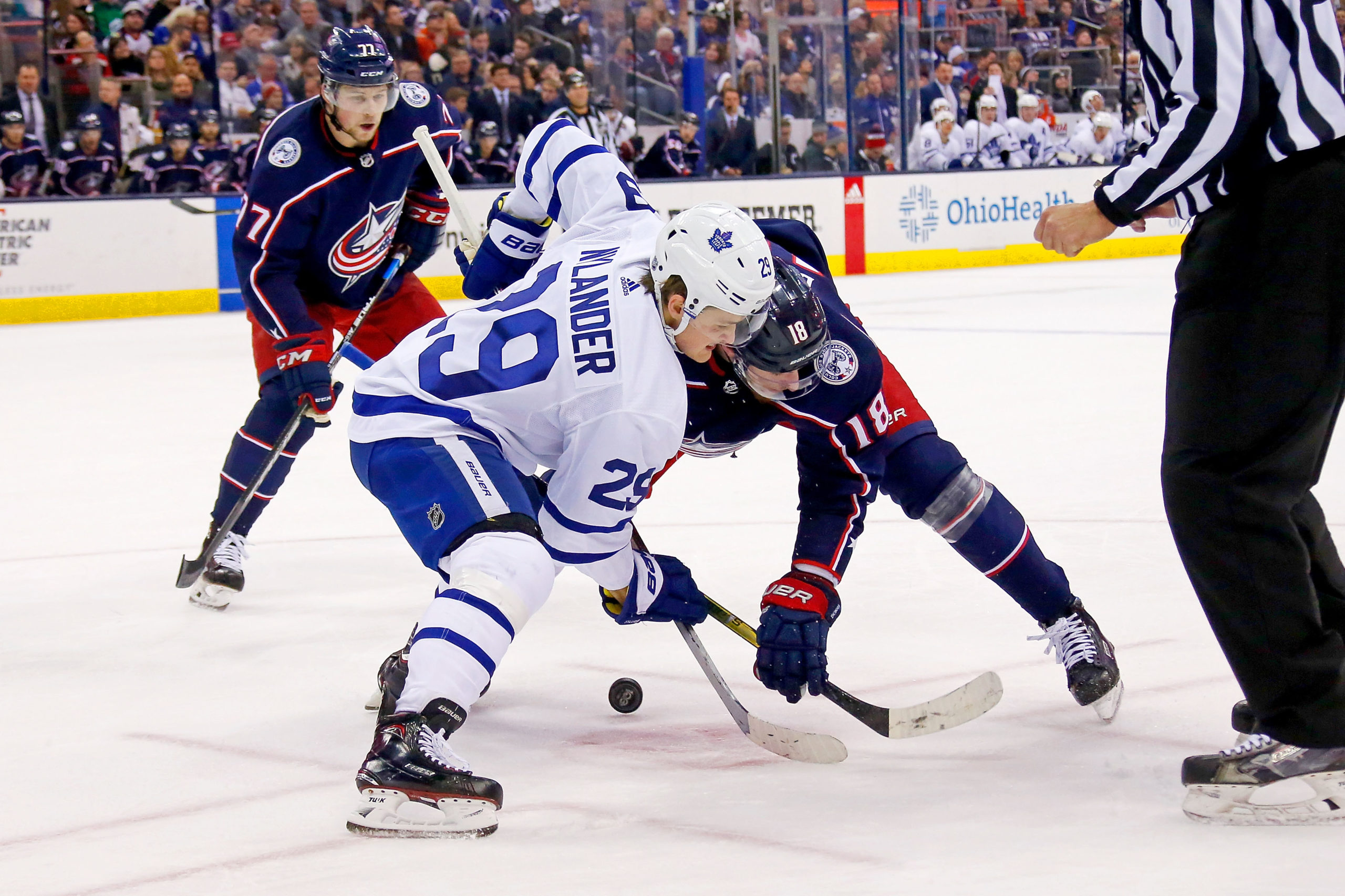
How do you like the matchup for your team?
Dubas: I haven’t really spent a ton of time yet focusing on the matchup precisely. I think our focus right now has to be on our own team and what we can do to control everything that we do. The one thing that we have stressed has been that there is going to be a massive advantage and edge to the teams that come back in great physical condition and great shape and are able to guard against injuries and all of the other things that are going to crop up as we do something that is unprecedented — which is return right back into the heat of competition.
There is not going to be a long training camp and an eight-game exhibition season and an 82-game regular-season schedule. It’s going to be right at it. We’re trying to look at those various things and not obsess about Columbus for seven weeks. Once we get a little bit closer, we’ll shift the attention to them.
They’re obviously a very, very well-coached and well-managed team and have a great identity to them. We are certainly not taking them lightly and we know what we will be in for in terms of style of play, but for right now, I think we really need to focus on ourselves and putting ourselves in the best spot to have success.
How do you feel about this 24-team playoff bracket to begin with, in general, as a GM of a team that was likely going to be in as a top 16 team?
Dubas: I think they put a lot of work into it. I don’t think there was a perfect way to just decide it. Purely based on playoff odds and probabilities, we were looking good, although on some nights, you wouldn’t say that about us — and lots of people will remind us that we did have our ups and downs. Purely on the probability standpoint, if you look only at the math of it, our odds were very good, and now we will have to play in a series.
In the long run, I think this will be a very good thing for our group and for the growth and development for our group of players and our whole organization. If we are going to win the Stanley Cup now, we have to win 19 games rather than 16. We are going to start off with a very difficult opponent that obviously made waves in the playoffs last year and has had a great year.
It is going to be very difficult for us. The challenge is obvious. It will provide us with a great chance to grow. It would be nice if we were to just start off and be gifted that playoff positioning, but I think the positive, for us, is that it makes the challenge a little bit harder and I think that is what we need at this time in our development as an organization.
What’s it going to be like scouting the Blue Jackets for six straight weeks?
Dubas: I don’t think that is the plan. Our focus is going to be on making sure our team is in the best place it can be, and then as we get ramped up as we normally would heading into a series a week or so before — if you’re afforded that much time in the regular season into the normal playoff cycle — then you start to focus on it. Right now, we know that they are a very dangerous team, an incredibly hard-working team, and very well managed and coached. We know that it is a massive challenge, and in order to set ourselves up for that, we need to make sure we are giving our players the resources to get themselves in the best condition possible so they can be healthy and safe and ready to roll. That is the place we are at right now.
Now that you have some sort of structure in front of you, how much did yesterday help you narrow the focus?
Dubas: It is really hard when you don’t know what you are preparing for and what the endpoint is that you are preparing for. Whether it’s a show or a test in the future, when you don’t know what it is, you don’t know how to direct your organization, especially the players and the coaching staff and the medical staff. Now that there is an endpoint to this and we know at some point — if we are given the clearance to do so and it is safe to do so and it is best for the communities to do so — that we are going to be playing the Columbus Blue Jackets in a best-of-five series, and we are going to have to win up to 19 games to win a Stanley Cup, it gives you a real sense of clarity in terms of what you are working towards.
Once we start to get the dates rounded out for the different phases — Phase 2 and 3, and then the actual resumption of competition in Phase 4 — then having those endpoints in mind really helps to provide some clarity to our staff and to our players. It makes things a little bit easier rather than trying to project ahead when you don’t have any of the answers.
The one thing we have heard since the format was finalized: The Leafs, with as hungry of a fan base as exists in the NHL, if they go on a run and wins the Cup, fans around the NHL will say it wasn’t a real Cup or it was an asterisk Cup. How would you respond to that?
Dubas: I think people can say whatever they want and it wouldn’t make a lick of difference to us and to our fans — certainly not to our staff or players. I’m sure the other 23 teams that are going into the competition will feel the same way.
Because of how difficult it is going to be with the lockdown at the end of the season, and then into this competition after training camp, with how difficult this is going to be for the whole organization to deal with in July and August, I think it is going to be one of the more difficult championships to win.
Whoever wins it, anybody who takes a shot that it is illegitimate, especially when 85% of the season was already played, I think that is frankly stupid.
One of the arguments we’ve heard is that it is unfair to a team like Boston who was 10 points clear in the East but might end up fourth in the East when the round-robin is done. Do you understand that frustration from some, or does it just mean a better chance you finally miss them in the first couple of rounds?
Dubas: People have asked us the same thing: “Our percentage chance of making it were X based on whatever model you want — maybe 80% — and now they’re back down to 50-50.” In the case of Boston, Colorado, St. Louis, Tampa Bay and the rest, they certainly are going from having a really strong case — especially in Boston’s case — of being the number-one seed to playing in the seeding round-robin and potentially being fourth.
I just think with the time off and with coming back in with training camp and a few exhibition games, the level of randomness will be so high that whether you are first or fourth, I don’t know if, in the end, it will really matter. The same applies to us with whether we are guaranteed one of the spots in the playoffs or if we were going to be playing in a qualification round.
It would certainly be nice to be right in the first round, but this is not a perfect situation, and all of the people involved on the NHL and NHLPA side have tried to create a format that is fair to reflect what was left in the regular season and incorporates the most number of teams and markets as possible but also tries to reflect where every team was at.
Frankly, I can only speak to us. You could have never predicted on March 12th that the season would be suspended, but we didn’t want to be in that position of being so close to the line. We had to play better during the year and be more consistent during the year. This is where we are at. We are right where we are supposed to be and the challenge ahead will be great for us.
On the status of his players at the moment
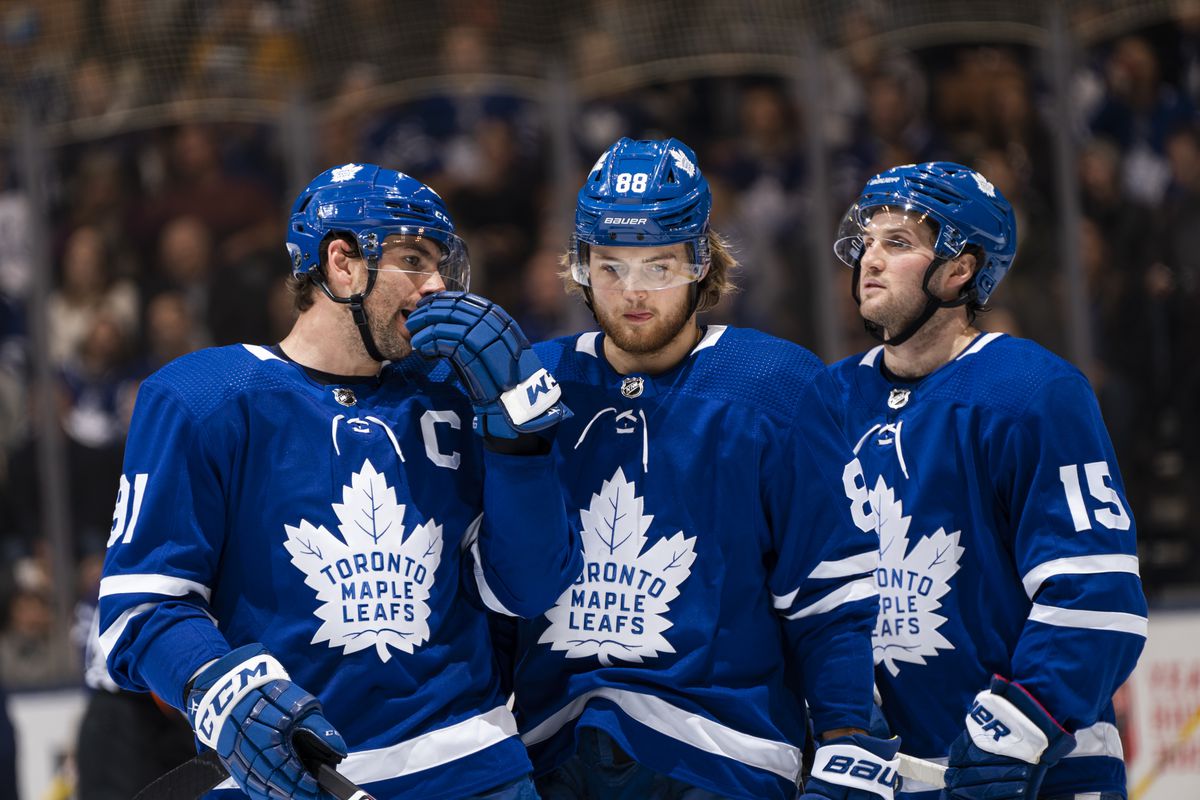
Can you give us a sense of where your players are at physically? Where are they in the world? How many are in Toronto and how many are elsewhere? Will everyone be healthy when it comes time to play — Mikheyev, Muzzin, even Johnsson?
Dubas: As of right now, we do have players on the injured reserve. Of those players, it is our expectation that Muzzin and Mikheyev will likely be cleared. They can’t be formally cleared until they go through that entire return-to-play process, which will include actual practicing and contact and so on. They remain on the injured reserve.
Johnsson will not be ready. He is a ways away yet. It was a pretty substantial surgery — six-month recovery at the time, and that was in mid-March. He is still three months away or approximately three months away from us even considering him as eligible.
In terms of where the guys are, most of them are making their way back from the sounds of it. We’ve got some guys in Europe and some guys in the U.S., but we’ve got a lot of players in Canada and a lot of players in Toronto already. That will be a positive for the players that want to take part in Phase 2 and volunteer to do so.
We see through the playoffs teams need to rely on their depth because of injuries. It is being reported 28 players and maybe as many goaltenders as possible. Is that enough to make a long run, or is there maybe some potential pushback on having more players accessible?
Dubas: I wish I knew the exact answer on all of those fronts. Because there is really no experience for anyone to draw on… maybe the only kind of relevant example would be the Canada Cups or the World Cups that have happened prior to the season in August and September previously, where the players would’ve been off for a long time and then returned to those camps and got into those types of competitions right away. Maybe the Hlinka tournament that happens for those types of players in the summer — the junior-age players.
With regards to going through the Stanley Cup playoffs, there is certainly nothing to reflect back on and see how it is going to go on and how many players we are really going to need. The thing about our depth is that one of the benefits in looking back at the season — and it certainly wasn’t a benefit at the time — is that we did have quite a few injuries. All were various freak things to Rielly, Muzzin, Mikheyev, and all the way down the list of players who missed time.
I think we know what we can expect from the players that have served in those depth roles. It has also given us an opportunity to see what someone like Justin Holl can do and Pierre Engvall and various different players like that. I think we like our depth and are happy with it, but I think we are excited to see the team fully healthy again.
As it pertains to how many guys that we’ll need, I am sure hoping that the 20 guys that start are the 20 guys that finish. As you know, that is wishful thinking, especially after they haven’t been doing anything for a few months. If it is 28 or whatever we have to take with us to the hub city, I am sure that if there are various issues with it, nobody is going to want a situation where teams don’t have enough players. I am sure the NHL and NHLPA, as they have throughout this process, will find a way to make something work.
As you sit here with the 14-day quarantine in Canada still in effect, can you even plan to call players back from Europe or the States? What texts did you get from certain players in the last 24 hours and what are you telling them?
Dubas: We had a few players a few weeks ago make their way back here without really any indication it was going to end. Really since Sunday night, we have had the majority of our players reach out and seek clarification on the quarantine that is issued under the Quarantine Act in Canada and how it impacts them. I think they have had questions about where we see that going in the future and so on and so forth.
Our guidance has just been that we don’t know what that is going to hold. It is the law now. We would expect and operate as though that is what exists now. It may change, but these are the conditions that currently govern them if they return to Canada. With all of them, each of them is in a different situation. The players coming back from Europe, certainly, there is not a whole lot of options in terms of flights and so on and so forth.
It is just trying to provide some guidance in terms of what we would like as an organization and really, where they are at. It is a voluntary phase, so we can’t say, “Hey, you need to be here.” But I think our facility and what we have done to prepare for everything opening will be extremely safe and a great place to train if the players elect to do so.
It has just been educating the players on what we are doing, what is going to govern them as they return to Canada from outside of Canada, and just making sure that they are aware of everything that we would provide if they were quarantined in terms of support. It is a tough question to answer, especially when players have a place they can train and access, whether it is in their home or different private facilities that are open wherever they are at.
I understand where the players are at in terms of saying, “Geez, I can work out here. If I come back to Toronto, I’ve got to be in my condo or house for 14 days and I don’t want to lose those 14 days.” It is tough. You just try to go through each individual circumstance as they come and help the players as best we can.
In the end, in this phase, they have to make the decisions that they feel are best for them and we will roll from there.
Have you gotten any word about players not being comfortable with returning to play in these circumstances?
Dubas: We haven’t. We have had a lot of players ask — and I think it’s been a great part of it — a lot of questions of our medical people. I know the league and PA have given the players a great opportunity to ask questions of their different infectious disease specialists and various people that are being used as consultants for the league and for the PA and each individual team as each prepares to open their facility.
The players have asked a lot of good questions about it. I think we want to encourage them, if they do have any concerns or fears whatsoever about the virus or about how it could impact them or their families, to ask the questions and be comfortable.
As of this moment, we haven’t had any player state specifically to us that they are uncomfortable, but I think as the reality of the phases start opening, perhaps those questions become more prevalent.
We haven’t heard much clarification on family members. What are you hearing along those lines? How many will be allowed? What is the feeling?
Dubas: For all of us, if it is going to be a month… once you’re in the hub, you’re hoping it’s going to be as long as possible because it will mean you’re continuing to win and continuing to advance. It is hard to say. We have all been with our families now for 77 days or whatever it has been. Thinking of not being with them — just speaking to my own case — would be strange to think about. Certainly, you’ve grown accustomed to operating in a totally different way.
I would say that with things changing so rapidly… I think back to three months ago, and we would’ve had no idea where we were going to be in terms of testing or vaccination or therapeutic applications that can help deal with the virus. My hope is that we are at a place where, as things progress in the tournament, families would be permitted. I know it has been brought up and discussed by the players, and I know that the league and the PA are both certainly looking into solutions on it. In the end, I know that they will do the right thing.
We will so what comes up from that. My hope would be, especially deeper into the tournament as the moments become a little bit more special for the players and everything they’ve worked towards, that at the very least, the players are able to have some family members there as select as it may be.
On Nick Robertson attending training camp
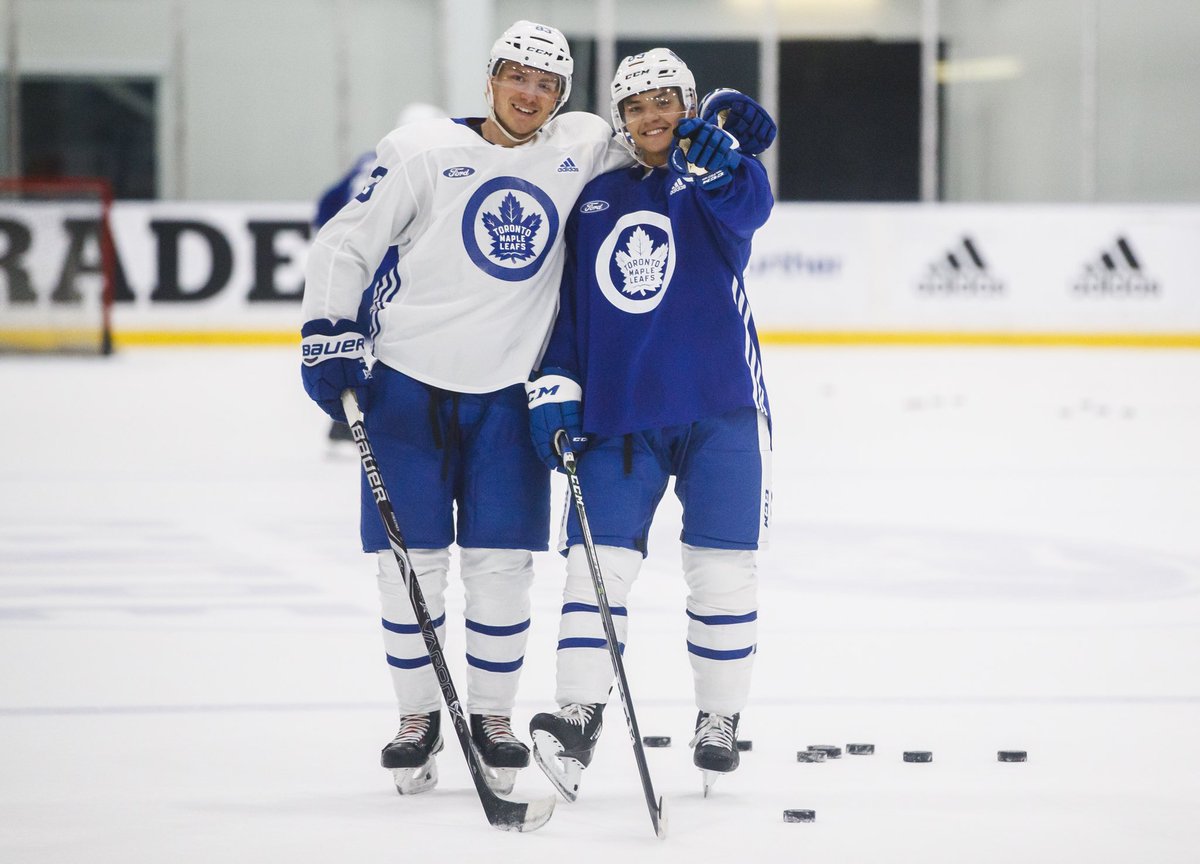
What has to happen for Nick Robertson to actually play games? Can you picture him playing games once you get started?
Dubas: It is going to depend on how he performs — not so much in this Phase 2, but once we get into the training camp portion of it and whatever is formally decided on the exhibition front. Yesterday, there was some talk about there being two exhibition games. Once that is all formalized and done, I think we will have a bit better of an idea in terms of what will be available for Nick and for all of our players that are battling for roster positioning.
Once we have an idea of what it is going to look like — how long training camp is going to be, what type of training camp format we’ll get — he will get an opportunity, as will all of our guys to show where they are at. That’s the way we will likely base it — if he performs the way he is capable and shows where he is at, I could see him getting an opportunity. If not, I think it will still be a great experience for him.
What will adding Nick Robertson to the roster do for the team in the short term and what does it do for his development in the long run?
Dubas: I’ll just clarify. Number one, he is going to come in — if he would like to, and he is on his way here to voluntarily report in for the stage-2 part of it and the training camp part of it — and then we will make our decision with whatever is decided in the process of naming your roster. Whether I misspoke earlier or not, I am not exactly sure, but my answer was to whether he was going to be a part of it, and my answer is yes. He is going to be a part of Phase 2 because he has already traveled into Ontario so he can do his quarantine. He will be a part of Phase 2 and Phase 3. Whatever he gets from there will be whatever he earns in training camp in the Phase 3 part of it.
In terms of why we would want him to be a part of Phase 2 and Phase 3, I think he has earned it with his play going back to last summer with the World Junior summer showcase and then in our training camp and certainly the season with Peterborough, in addition to his World Junior performance. We just think he is a player that continues to greatly improve.
More important than anything with Nick, you are certain he has kept himself in great physical condition throughout this quarantine and lockdown portion of all of our lives. I know what his focus is like and what his commitment level is like. Regardless of whether he makes the final roster to go into the hub city, wherever that may be, this experience will be great for him to be around our guys that are volunteering to be here in small groups and as part of the group in training camp. We’ll give him a chance to compete for a roster spot with a small number of people that are going to be in the formal training camp stage.
At the very least, it will be a great experience for him and his development. At best for him, he continues to show the strides he did during the year and forces our hand and finds his way onto the roster and into the lineup.
At worst, even if he doesn’t make it into the formal tournament, I think it is a great experience for him and his development. I know that he will be raring to go whenever he is cleared to begin participating.
On the 2019-20 regular season
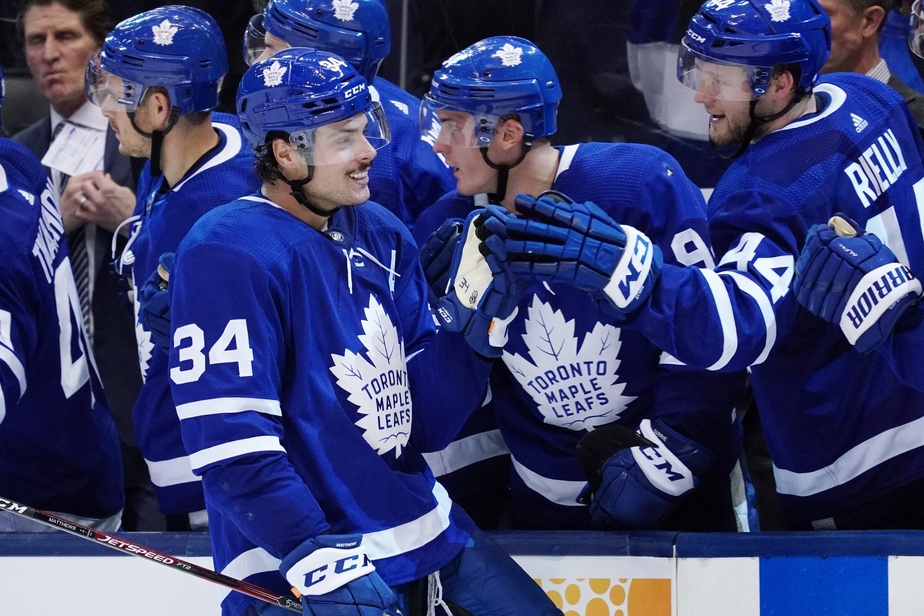
We can now put a bow on the regular season. There were a lot of ups and a lot of downs. It was kind of a soap opera season. Now that it is officially behind us, what will stick out for you? How will you look back on the season five or ten years down the road?
Dubas: A lot happened during the year. I think the thing I was most happy about: We had a lot of disappointing stretches and moments during the year where we weren’t happy with the way that we performed, and the thing I came to like most about the group — even going back to the last game we played versus Tampa after a very disappointing trip to California — whether it was in Tampa Bay after the Carolina game or the stretch in February where we went into Buffalo and Pittsburgh and got our butt kicked, when we had dangerous opponents waiting for us in the moments when we were vulnerable and our back was against the wall, the team was showing a real ability to push back and buckle down defensively.
Now that the season is over, we can say that in a lot of those games and in some of those stretches, we didn’t have Rielly, Muzzin or Ceci. I was really proud of the way that the group was able to respond in those moments. I wish we were never in those positions and we were a little more consistent, but I think part of the growth is being able to find your way out of it when things aren’t going well.
I think the group was really starting to show that. The next step for us to embrace those obstacles as they come and become much more consistent in our mindset and day-to-day performance. I think that will eliminate a lot of the ups and downs and drama that comes along with it.
Did you get texts from players pissed they didn’t hit some bonuses?
Dubas: [laughs] It is interesting. We are beyond that portion where we have a lot of… as everyone well knows, we have had some contract negotiations in the last number of years, which ended the entry-level portion of the contracts that have the bonuses in them. We didn’t really have a whole lot of those.
It was disappointing, though, with Auston not having the chance to challenge for the Maple Leaf goal record held by Rick Vaive and ending off one goal behind Ovechkin and Pastrnak at 47. Auston had a great year for us. It would’ve been nice to see him continue to push down the stretch, especially as we had guys — Morgan, Jake Muzzin — coming back from injury. I think that only would’ve aided that push for him to win the Rocket Richard Trophy and it would’ve been a great accomplishment for him and well deserved.
That’s the one disappointing part for us — Auston doesn’t get a chance to go for the Maple Leaf single-season record, nor the Rocket Richard. But in his case, I think we can expect him to be in that race for a long time in his career as a Maple Leaf.



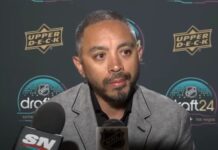



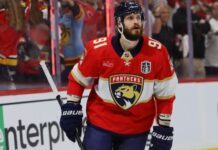


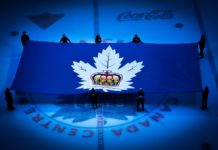

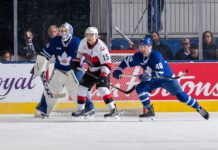
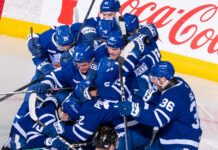




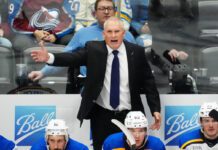


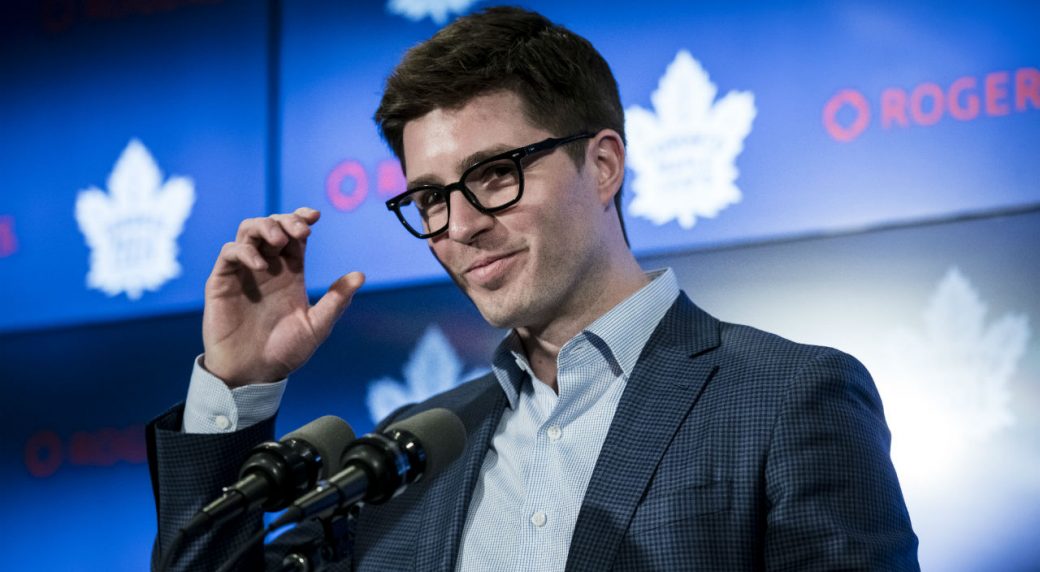
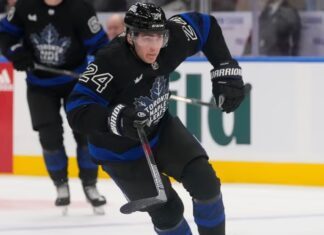







![New Leaf Anthony Stolarz on the opportunity in Toronto: “In Florida, I knew my role as a backup… Now, [Joseph Woll] and I are competing for starts… As a goalie, that’s all you can ask for” Anthony Stolarz, Stanley Cup win, now Maple Leaf](https://mapleleafshotstove.com/wp-content/uploads/2024/07/anthony-stolarz-sc-100x70.jpg)
